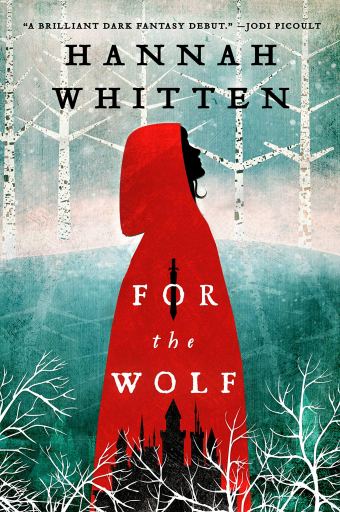It doesn’t look like the plethora of fairytale-inspired fantasy novels is going away any time soon and we at Breaking the Glass Slipper are enormously grateful! After all, I first met Charlotte at a convention where she was on a panel discussing fairytales – and with a BtGS favourite too, Juliet McKenna!
One of the most anticipated reads of this summer is the debut from Hannah Whitten, For the Wolf. A dark and sexy fairytale and folklore-inspired novel. We asked Hannah about some of the dark themes and how she created more of a ‘flavour’ of fairytales than a simple retelling.
A number of contemporary narratives inspired by fairytales have started to critically explore the idea of the female sacrifice to the monster. Why did you want to look at this trope and what do you think it says about the traditional stories that they were so eager to give young girls up to monsters?
For me, and for I’d assume a lot of writers who are exploring this, it’s because we were brought up in environments where sacrifice was expected of us. We’re supposed to sacrifice our dreams, our ambition, and our bodily autonomy if it makes life easier for others, and the fact that there’s so much sacrificing happening in fairytales is tied to that sort of universal understanding that we’re expendable. Fairytales just take what we live with and put it into fantastical terms so we can deal with it. I think reading and writing about people who fought their way off proverbial pyres can help us forgive ourselves for all the times we didn’t. I was also interested in exploring what happened after you made the choice to go through with sacrificing yourself—why you would make that choice, the kind of fear that would make you think it was for the best.
While there are very obvious Little Red Riding Hood nods in For the Wolf, the ‘monster boyfriend’ romance at the heart also takes a lot from Beauty and the Beast, with elements of the Green Man folktale thrown in for good measure. What were the benefits of mixing identifiable elements from many fairytales rather than sticking more strictly to a specific retelling?
I really wanted to make something that was more a nod to folklore, rather than a strict retelling of a certain tale. I wanted FOR THE WOLF to feel like a fairytale in its own right, something you could believe was a legend passed down. Mixing up the different fairytales also gave me a lot of things to play with and twist, and a bunch of new directions to explore, rather than being confined to one specific story. Plus, all the different elements I pulled in had a lot to do with sacrifice and choice and consent, which were things I knew I wanted to include.
The magic in For the Wolf is quite visceral, using blood as power. How did you come up with this magic system? What did you want to explore with it?
The magic system actually went through a TON of different revisions and was completely different at the beginning than how it ended up in the final product. Arriving at the conclusion of Eammon using his blood to appease the forest inside and outside of him—essentially, giving up parts of himself to try and keep the whole—ended up fitting in really well with the other elements of agency and autonomy that I was exploring with Red. I really loved that they were on extremely similar journeys even though their circumstances from the outside looked very different, that both of them were just trying to find a way to keep themselves together. It ended up strengthening the romance at the heart of the book, too. Red and Eammon cling fiercely to the idea of saving each other partly because they feel there’s nothing they can do to save themselves. They understand each other in ways no one else can.

Unlike many of the fairytale retellings we have seen recently, For the Wolf is very dark, and arguably more in line with actual fairytales as a result! Why did you want to pepper your narrative with such dark themes?
Honestly, the darkness just kind of came part and parcel with the themes I wanted to explore. I’ve always been a big horror fan, and while I wouldn’t call WOLF horror, it certainly has those elements there, mostly because that’s the kind of thing I’m drawn to, and it seemed like the best way to go about what I was trying to do. And I did want it to feel like a really old fairytale!
Pitch us For the Wolf! Why should everyone pick up a copy?
If you’ve ever wanted a love story that makes your chest ache, with a side of bloody nature magic and disaster sibling angst, WOLF is for you!

Hannah Whitten has been writing to amuse herself since she could hold a pen, and sometime in high school, figured out that what amused her might also amuse others. When she’s not writing, she’s reading, making music, or attempting to bake. She lives in Tennessee with her husband and children in a house ruled by a temperamental cat.


